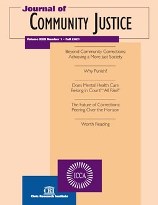Complete Issue
Author: Donald G. Evans.
Source: Volume 25, Number 03, Spring 2016 , pp.1-32(32)

< previous article |return to table of contents
Abstract:
This issue of JCC contains three important articles on subjects that are of importance to the community correctional practitioner: fidelity in the use of risk assessments, gender-specific treatment, and the attributes of case managers that contribute to successful outcomes for correctional clients. Brandon Mathews, adjunct instructor at Colorado State University-Pueblo and a consultant at Strategic Implementation, Research and Consulting, addresses the issue of fidelity in assessment, a very important aspect of using risk-assessment instruments. He illustrates the current coaching and training challenges that contribute to the Level of Supervision Inventory (LSI-R) administration and fidelity concerns. Mathews introduces the Risk Assessment Fidelity Tool as a solution for practitioners using the LSI-R. The article also has a good summary of the quality and fidelity literature related to the use of the LSI-R. Dr. Randy Shively and Dr. Rose Ricciardelli remind us that the pathways to prison and problems in reentry differ in many ways for women and men, and their examination of these pathways provides a better understanding of the treatment needs of released women. These include the need for intensive substance abuse, trauma, and sexual health programming. The authors also note that relationship development is critical to successful treatment programs and that the development of healthy relations between staff and women receiving care is an important aspect of the work with those released from prison. Krystine Jackson, a predoctoral psychology intern in the Graduate School of Professional Psychology at the University of Denver, and her coauthors describe a pilot study that was designed to identify specific attributes of case managers in community corrections that contribute to clients’ successful completion of their rehabilitation program. Given the recent interest in the importance of case manager and client relationship development, this study of case manager attributes is a very useful addition to the literature and to our thinking about the development of the therapeutic alliance. The results of the pilot study are promising and indicate that certain personality traits are more likely than others to affect treatment outcome. It would be helpful if we had more studies of this nature in the field of community corrections, and the authors call for more studies with larger populations of case managers in order to produce more robust findings.Keywords: The Risk Assessment Fidelity Tool; Gender-Specific Reentry; Case Manager Attributes
Affiliations:
1: Journal Editor.